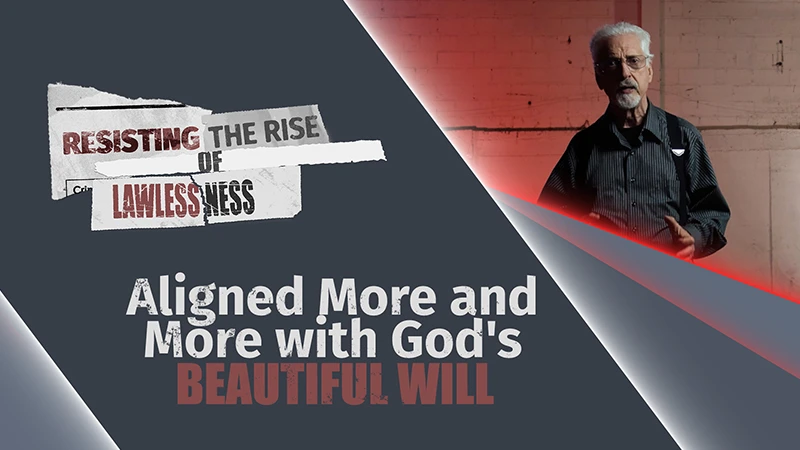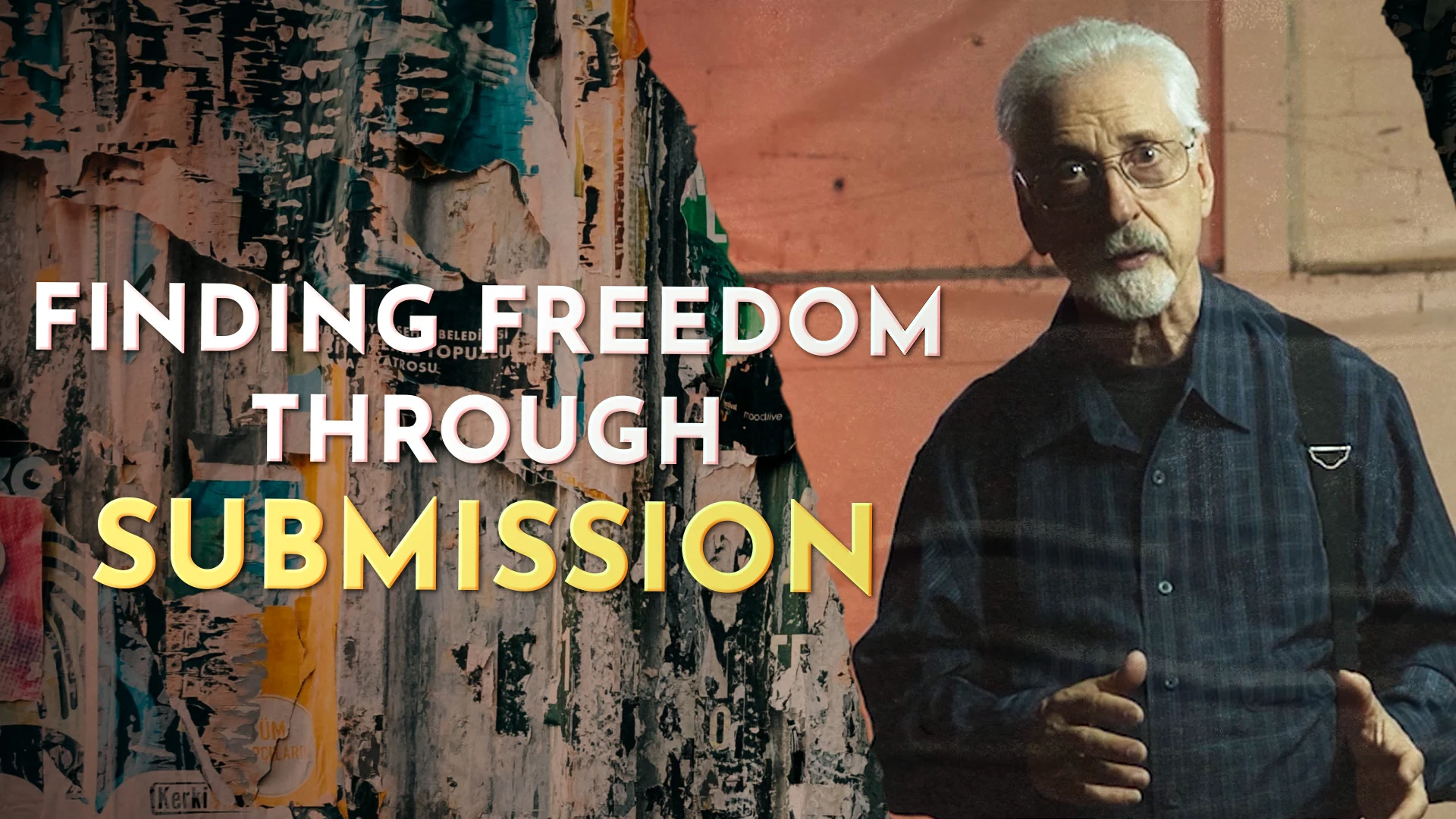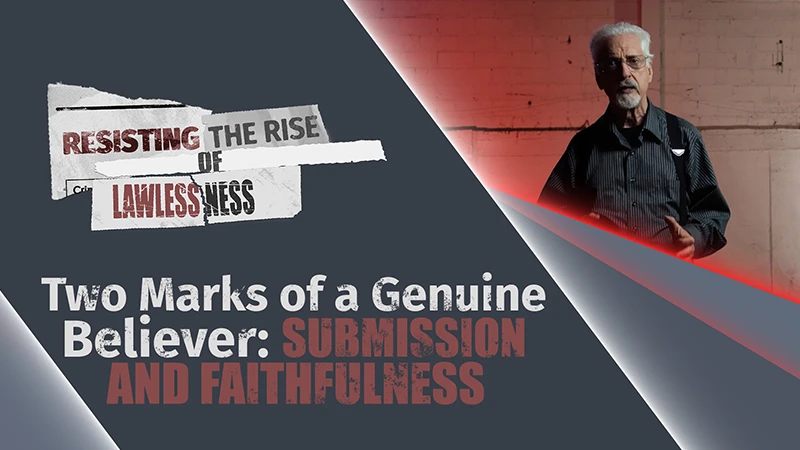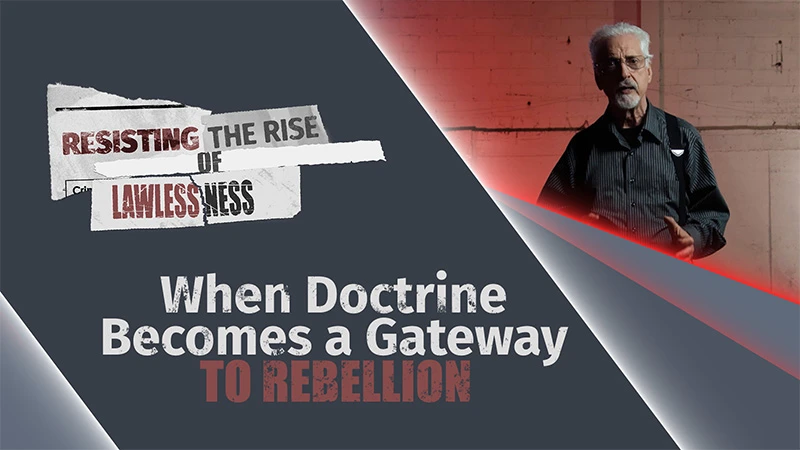
Latest episode: What is the unpardonable sin? Why do some in sexual sin fear they’ve committed it—and what hope does God offer the hopeless?
Every so often, people contact our ministry in deep despair, asking, “Have I committed the unpardonable sin?” In this Ask the Counselor episode, we’ll turn to Scripture to see what the unpardonable sin actually is, why those trapped in grievous sin often fear they’ve committed it, and—most importantly—what hope God gives to those who feel beyond forgiveness.
In our latest article, we explore the battle of the conscience and why hidden sin must be brought into the light.
How do you respond when the latest news story reveals that another Christian leader has fallen due to sexual sin? Many feel anger at the person or at the state of our church. Mixed in with the anger is often empathy for the victims and others close to the front lines. I remember what my response used to be:
Abject terror.
In those days, I lived in fear of the knock on the door or the phone ringing. I cleared my search history several times a day and kept my phone and computer closely guarded. When I heard of someone who had been exposed due to some sexual misconduct, my chest would tighten; my stomach would turn over. My ever-diminishing conscience would faintly whisper to me, “That could be you.”
Between 2008 and 2018, my life was on a downward trajectory. Entering college and getting my first smartphone fostered a porn habit that quickly got out of control. Every day I was viewing it more, always craving some new, more depraved image to behold. Naturally, my relationship with a girlfriend at the time quickly became physical. After college, I was introduced to websites where I could engage with both women and men anonymously and gave myself to dozens of such encounters, all while becoming engaged to my girlfriend.
I was a mess inside.
One day in 2013 when the conviction became too much, I confessed it all to my fiancé. Her response? “I don’t love you enough to work through this.” 3 months away from our wedding, it was over. The next day I felt so beaten up I couldn’t get out of bed and had no desire to eat. Logically this should have brought me to my knees before God and reset my moral trajectory.
Not in the slightest.
I spent half my time feeling sorry for myself and the other half hoping my reputation would stay intact, that no one would find out the truth about my secret life. In no time I was back to my old ways. With no relationship to hold me back, I felt the freedom to promiscuously pursue as much sex as I could get.
For 5 years two Patricks coexisted. There was the nice, fun-loving musician everyone knew and liked. Then there was the sex addict who chased girls, dabbled in homosexuality and fantasized about things he wouldn’t dare let anyone know of.
If I had had it my way, no one would ever know the real me. But God had a different plan. He knew I was on the fast track to a worthless future, possibly jail time, and a day when I would hear Him say, “Depart from me for I never knew you.”
So, He doubled down on the conviction.
Zoom out with me for a moment. What do you imagine goes through the mind of someone hiding unconfessed sin? It’s easy to picture them happy and content until their blissful façade is blown apart. But that is just not how sin works. God has given us all a conscience which can distinguish between right and wrong.
That’s why many men like me describe a strange mix of feelings when they catch their first view of erotic material. On the one hand it’s exhilarating. But inside, something is making them feel dirty and shameful. That’s the conscience at work bringing about conviction.
However, our conscience is not made of steel. It’s easily molded by our response to its influence. If we allow ourselves to be checked by its warnings, our conscience will grow more sensitive. If we stifle its voice in favor of carnal and sensual influences, it will weaken. And if we continuously indulge in sin, we will decimate it!
As I continually chose to indulge my lustful appetites, my conscience began to get weaker and weaker. In His mercy, God tried to get my attention another way. He allowed the painful consequences of sin to ravage my internal life. Depression, fear and anger took control of me. David’s words in Psalm 32:3-4 say it best, “For when I kept silent, my bones wasted away through my groaning all day long. For day and night your hand was heavy upon me; my strength was dried up as by the heat of summer.”
Not recognizing that these consequences were God’s hand of mercy trying to bring me to repentance, I kept stubbornly pursuing what I wanted.
But there were those knocks on the door, those phone rings, those news stories. Those occasions would remind me of the truth: You’re in sin. Your life isn’t right.
So nowadays when I see the latest story break, and hear the culprit trying to downplay his sin, I know that some level of deception has been at work for a long, long time. Either he is simply doing his utmost to stifle conviction and is purposely lying to protect himself, or he has been on the path of self-deception for so long that he can’t see what’s real anymore.
In my case, I was able to suppress conviction for five years. But by 2018 I couldn’t take it anymore. So I confessed my secrets once again, this time to my pastor. Thankfully, he had the courage to demand change in my life. That’s when I began to come into reality that I was not the good person I thought I was. And thankfully, my pastor knew what to do with me, which is how I ended up at the Pure Life Residential Program in Kentucky.
{{blog-si="/blog-ads-storage"}}
There is a long list of exceptional gospel communicators over the past forty years who maintained secret lives of sin. Paul gave the explanation for this seeming contradiction when he told the Romans that “the gifts and the calling of God are irrevocable” (Romans 11:29). It seems that when God calls and equips a man to minister to others, He will continue to use his ministry even if he is living a raunchy, secret life. This does not mean the leader is living the holy life which pleases God. Yet his successful ministry can be enough to deceive him into thinking he is a good man.
I wasn’t running a powerful ministry when my secret life was first exposed, but I still found ways to deceive myself into thinking I was “a good person.” I made a partial confession of what was really going on in my life in 2013, but because it was only half-hearted, it took five more years of living a double life before I began to take things seriously.
I was still very self-deceived when I arrived at Pure Life Ministries in 2018. I was convinced I was mostly good with just a small problem. Through the godly counsel and powerful exposure to spiritual truth I received there, I eventually had to acknowledge that I was sinful through and through.
David experienced a similar wakeup call when Nathan confronted him about his sin. The conviction of the Holy Spirit landed on good soil in his case. He cried out to the Lord, “Against you, you only, have I sinned and done what is evil in your sight.” The key there is that his eyes were fixed on the Lord.
If you ask the question, “Am I a good person,” with your eyes on yourself, it’s easy to answer, “yes.” However, a true revelation of God’s perfect character makes that conclusion impossible and will leave you broken and undone. That is the first step towards real and lasting change.
Many men who come to us for help struggle with this crucial step for a long time. It takes courage to face who you truly are. The process can be long and is undeniably painful. Every deed, whether good or bad, must be taken to God with an honest and open heart, asking Him to reveal the truth about how He views them.
Practically speaking, this requires examining our lives in light of Scripture, with a prayerful spirit, and without any preconceived idea of where it will lead. To assist, a godly man or woman must be there to help facilitate this process because a man in this state usually cannot distinguish the truth on his own. He’s been lying to himself for a long time and needs an objective third party to keep the truth in front of him. The kind of brokenness that can come from being confronted with the truth is the path into real change. Godly sorrow always leads to peaceful fruits of righteousness.
Nine months of this process in the Pure Life Residential Program brought me into tremendous freedom and joy inside which was unlike anything I had ever experienced before. Today I don’t live in fear, but in peace with a conviction that my life is right before God. It’s my heart that every man would experience this same joy and freedom, no matter what it costs them.
If your life is filled with dirty secrets, it’s time to bring them out into the open. It’s time to evaluate your life honestly and admit the real you is not the person you present to others.
Some reading this may object to my turning the tables like this, but the statistics on sexual sin in the church suggest I am not off here. Sexual sin is rampant in the pews. It is germinating in every church. Millions of men and women are hiding something. It is not only inhibiting their own walks with God; it is fostering the culture that is allowing Christian leadership roles to be filled by men and women who are spiritually unqualified.
My encouragement to anyone hiding sin, even if it seems like something small, is to show the courage to get help before it gets worse.
Trust me, it will.
In the first of a series of four sermons, Dr. John Oswalt delivers a profound message on Psalm 51 to the men in our Residential Program.
Over the next four weeks we will be featuring powerful messages by renowned Old Testament scholar, Dr. John Oswalt. These sermons were delivered in a series of special meetings to the men in our Residential Program. The altars were flooded every service for four days as Dr. Oswalt preached about the power God has to cleanse us.
Dr. Oswalt currently serves at Asbury Theological Seminary as professor of Old Testament. He has authored 16 books and is a contributing translator for the New Living Translation.
Replay: Is freedom over sexual sin even possible? Yes, if you learn how to defeat temptation! That's what we'll look at in this episode.
How many times have you promised yourself, “I will never do that again!” but then fell into sin again? The longer that cycle continues, you may start believing that freedom isn't even possible. That’s what Steve Gallagher used to think, until he learned how to win the battle against temptation. In this episode, we continue to share with you the truths found in our "20 Truths" YouTube series. Today’s topic? “Temptation is a Winnable Battle.”

Timeless Truths: Fasting helps subdue the flesh—a necessity for overcoming sexual sin—and allows the spirit man to grow in grace.
Timeless Truths: Fasting is a spiritual discipline that brings the flesh under control—a must for anyone who wants to overcome sexual sin—and allows the spirit man to grow in grace. In this segment, Steve Gallagher gives practical and spiritual advice about establishing a regular habit of fasting.
Host: Hey, Steve, the question we want to deal with today has to do with fasting. An email came in with the question, “What is your view on fasting as it relates to overcoming sexual addiction?” And secondly, “Does Pure Life Ministries incorporate fasting in the Residential Program?”
Steve: Well, I believe in fasting. For one thing, it's a biblical concept that is fairly well stressed and there are good reasons for it. Fasting has a way of taking a believer out of the realm of the senses. We are so dependent on our senses and food is probably the predominant physical desire/need that we fulfill most regularly. And so, when you cut yourself off from food for a day, first of all, it weakens your flesh and that allows your spiritual life to be more robust. I know for myself that when I fast, I am much more in tune and sensitive to the spiritual realm.
I don't know exactly how to say this, but it's almost like eating every day creates this spiritual sluggishness. And so, when you cut food out for a day, that sluggishness is gone and it allows your inner being to be much more aware of spiritual things. It's a wonderful opportunity for the Holy Spirit to speak into your inner man. It opens your heart up to His voice more. It makes you more aware of the spiritual kingdom. It allows you to enter into a time of worship and powerful prayer. Fasting is very wonderful for the spiritual man. It's a difficult discipline to do, but it is a very wonderful discipline.
Host: And just practically too, when we're talking about developing habits, whether they are good habits or bad ones, if we're doing it every day, like eating three meals a day, it is a habit. And so practically, fasting is a good exercise in breaking a habit.
Steve: Well, let's face it, sexual addicts have a history of living to gratify their flesh and food is certainly one aspect of that. So, it's not uncommon whatsoever to see a guy who's a sex addict also be addicted to food. So yes, when a sex addict occasionally fasts, it just serves to weaken the strength of his flesh and allow his spirit to take more authority in his life.
{{blog-si="/blog-ads-storage"}}
Host: In the Word of God, there are specific things we may be praying for that will encourage us to fast and to pray. But you think that it's a good exercise just to do occasionally even though there may not be something specific that you feel you need to fast and pray for, but just as an exercise in denying the flesh?
Steve: Yes, absolutely. It not only is a discipline of our ongoing Christian life, but for instance, when the disciples tried to cast a demon out of a man and they were unable, even though they had done it before, Jesus said this kind does not come out except by praying and fasting. That shows the power that fasting has in the prayer life.
Host: Well, now let’s address the second part of the question we received. Do we encourage fasting in our Residential Program?
Steve: One of the things that Jesus said about fasting was that when you fast, don't do it so that others can see you do it. That also applies to praying and acts of righteousness. But in regard to fasting, a lot of people will do it because they want to be seen as spiritual. So, in our Residential Program where we deal with guys who have a long history of sexual sin that comes out of a robust self-life and a foundation of pride, we have to be careful about something like fasting because what could be a good thing for some could easily be turned into just another avenue for pride to become stronger in another.
Host: Steve, in the time we have left, can you give some examples of how someone who may not be familiar with fasting can practically begin doing that?
Steve: What I feel like is a reasonable way to begin a life of fasting is to basically fast two meals once a week. In other words, let's say every Thursday you eat your dinner at night and then you don't eat again till dinner the next night. Whatever works best for you. But that would be so that you miss a couple of meals in a row because that will be enough to take you into a weakened physical state without it being too overwhelming. And if you do that on a regular basis, whether it's once a week or once every two weeks and just allow it to become a regular ongoing part of your life, it really does become easier and easier to do.
Host: So let me understand now. So, you have a meal and at that meal you eat 2 giant pizzas. Then you fast for a couple of meals and then you go and have another meal with two more giant pizzas? Haha.
Steve: Well, that's the way I did it. Haha.
Host: Well, the point I'm making of course is that this isn't just a mechanical exercise, but this is a heart issue.
Steve: Yeah. But you know, the truth is, maybe that's the way some people need to start. Maybe they need to start by kind of gorging themselves in that one meal so that it will hold them over. If that's how they have to get this discipline started, then so be it. God's not all wrapped up in that, but you are making a good point that we need to let fasting have its way in our physical being.
Steve Gallagher preaches on the importance of the Old Testament in the life of a believer.
In the 32nd message of our “Unveiling Yahweh” series, we will be looking at God’s love for the Old Testament.
The Old Testament makes up the vast majority of Scripture. Yet mostly New Testament passages form the basis for Sunday sermons across our country. Certainly the New Testament’s importance cannot be understated—but neither can the Old Testament’s. Not only does the Old Testament provide a framework for how to understand the New Testament, but it also teaches us crucial things about walking with God.
In today’s sermon, Steve Gallagher aims to give us a greater reverence and love for the Old Testament and show why it will help you find freedom and victory.
.webp)
We end our series discussing God's discipline in the life of every believer.
“Sin and holiness cannot go on in mixed form forever. Either we must be saved from sin or sin will damn us forever.” – J.B. Chapman
Men and women seeking to resist the rise of lawlessness will find the strength to do so through the Lord’s discipline. This may seem counter intuitive. But Christians who exhibit the greatest character are the ones who have been tried through the hottest flames.
This episode:
· How God’s discipline will strengthen you
· How His discipline proves His care for you
· The blessings promised if you endure discipline faithfully

This episode: God brings discipline into His children's lives to check lawlessness and bring us into closer alignment with His sweet will.
When we surrender to God, He takes a personal and intimate interest in our lives. Because lawlessness still lingers in our fallen nature, He lovingly disciplines us—not to harm us, but to draw our wills into closer alignment with His beautiful will. As we yield to that process, we discover more and more of the peace and fulfillment that come from living under His authority.

Steve Gallagher talks about how living under God's authority brings freedom.
People don’t like being told what to do—especially when it’s God placing the orders.
But when we live under God’s authority, we’re also given the power to live out the Christian life and unshakable support to withstand life’s trials.
This episode:
• An inside look at the authority structure of God’s Kingdom
• How coming under God’s authority anchors us when life is hard
• Why submission to God offers hope nothing else can

This episode: There are two character qualities in every true believer—submission to God and faithfulness in the midst of life's trials.
As we’ve seen throughout this series, a spirit of lawlessness has infiltrated much of the church. But scattered across this world are those who have rejected lawlessness and submitted themselves to God. In this episode, we’re looking at two character qualities that exist in every true believer: submission to God and faithfulness in the midst of life's trials.
Steve Gallagher teaches about the inherent flaws of the hyper-grace movement.
Imagine a country where you could break the law and get away with it.
Actually, you don’t have to imagine it all.
The hyper-grace teaching in the American church has unleashed chaos and confusion—creating a system where disobedience is excused and holiness is optional. As a result, millions of believers are disobeying God’s laws without any remorse or desire to change.
This episode:
· The inherent flaws of the hyper-grace teaching
· A look at the true grace of God
· Understanding the harmony of holiness and grace

This episode: What if people kept hearing sermons implying that obedience is optional? You'd have a church culture primed for lawlessness.
It's nearly unthinkable that a pastor would come right out and say, “It’s all grace—live however you want, and you certainly don’t have to obey God!” But what if sermons are being preached every week across America that imply exactly that? Today, we’ll talk about the doctrine that has quietly created an atmosphere of lawlessness inside the church.